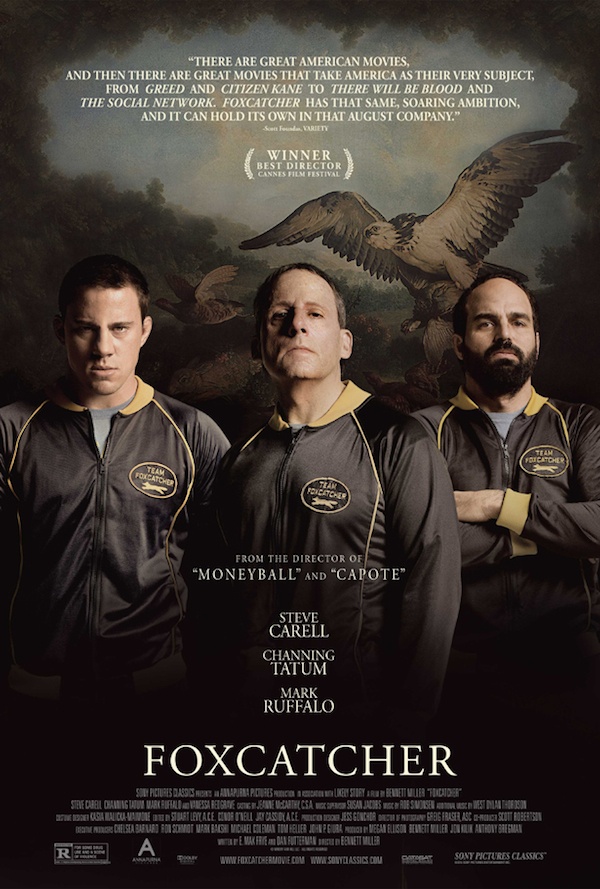December is an extremely busy time for cinephiles. With the coming of the holiday season, studios push Oscar bait out into theaters in order to qualify for the Academy Awards presented in February. We wait and wait for the air to turn cold so that we can view the year’s best films in a dizzying sequence during the happiest time of the year. We desperately hope to receive the great movies we were promised.
Foxcatcher (2014), as with so many high-profile movies subject to early year hype, is a bitter disappointment.
Directed by Bennett Miller (Capote; Moneyball) and based on the true story of the Schultz brothers (American wrestling heroes) and their disturbed benefactor John du Pont (heir to the DuPont chemical fortune), the movie follows Mark (Channing Tatum), the younger of the brothers, on his rocky journey to the 1988 Olympic games in Seoul. Steve Carell, hidden under a prosthetic nose and intense makeup, stars as du Pont, whose sprawling East Pennsylvania estate (Foxcatcher Farms) serves as the living and training quarters for Schultz and his teammates. More a dramatic character study than a sports movie, Foxcatcher often feels aimless and interminable.
In its defense, the film is visually striking, contrasting the power and beauty of the Pennsylvania woodland with the dark and dingy lighting indoors (mirroring the emotional arc of Mark). Du Pont’s mansion is filled with material trinkets, sterile doll house fixtures meant to be seen but not touched. The off-kilter mega-millionaire lives in a massive farm house with his servants and disapproving mother, wallowing away like Charles Foster Kane from lavish excess. Carell wrings out as much mileage as he can from a poorly written character, convincing the audience of du Pont’s desperate loneliness and delusions of grandeur.
Unfortunately, Tatum’s character is not in the least bit compelling. Mark’s relationship with his older and more decorated brother (Mark Ruffalo) is portrayed as a complex rivalry anchored in familial attachment, but the siblings’ obvious love is addressed superficially. Important details of the brothers’ backstories are explained with jarring exposition. Early on, du Pont’s aide privately questions Mark about his family history in a clunky scene- a grilling which serves only to inform the audience that the brothers had an unstable childhood.
Numerous unnecessary scenes of tell-don’t-show expand the film’s criminal runtime (134 minutes), exacerbating the effects of the deliberate pace. Movie magic also makes an appearance when Mark gains 12 pounds from an afternoon’s worth of room service fried chicken and then proceeds to make weight after a 90 minute sweat-a-thon.
The startling climax is at least interesting, but the film does not properly earn the drama of the conclusion. Rather than satisfied with the movie, I left the theater feeling as isolated and cold as Carell’s du Pont.
Score: 72/100.

